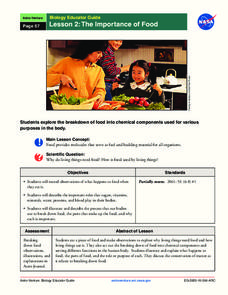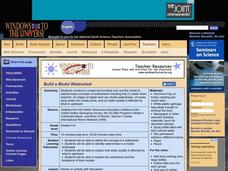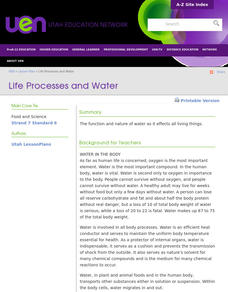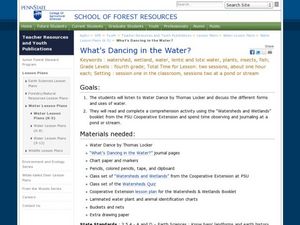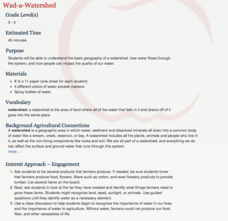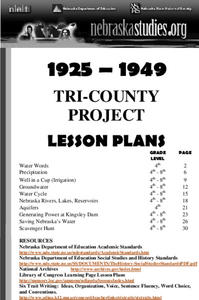Curated OER
Water is Life
Krill is a very small ocean animal that is key to keeping the ocean ecosystem going. The class reviews food webs and chains, learns about the importance of krill, discusses krill anatomy, builds a model of a krill, and then has a...
Curated OER
U.S. and Canada: How are We the Same? How are We Different?
Get high school geographers to compare and contrast Canada and the United States. They begin by drawing a freehand map of North America, then complete readings to gain insight into Canada. The text is not provided; however, another text...
NASA
The Importance of Food
Pupils make observations while eating food. They act out the process of food breaking down in the body and the roles of various chemical components, such as sugar and protein. It concludes with an activity illustrating the process and a...
Centers for Ocean Sciences
Ocean and Great Lakes Literacy: Principle 1
Is your current lesson plan for salt and freshwater literacy leaving you high and dry? If so, dive into part one of a seven-part series that explores the physical features of Earth's salt and freshwater sources. Junior hydrologists...
Cornell University
Buoyancy
Swimmers know to float by turning their bodies horizontally rather than vertically, but why does that make a difference? In an interesting lesson, scholars explore buoyancy and the properties of air and water. They test cups to see which...
Curated OER
Be Kind to Your Teeth
What kinds of food can be bad for your teeth? Kindergartners and first graders explore dental health with an interactive science inquiry. Given a choice of foods such as celery, cake, and milk, kids choose which ones are better for their...
Curated OER
Build a Model Watershed
Collaborative earth science groups create a working model of a watershed. Once it has been developed, you come along and introduce a change in land use, impacting the quality of water throughout their watershed. Model making is an...
Curated OER
Food And Energy
The different nutrients needed by the body and the reasons for each are presented very clearly in this powerpoint. There are 2 review questions at the end, but this PowerPoint is essentially comprised of facts and examples to assist the...
Curated OER
Life Processes and Water
Explain the properties of water. Identify the properties of water that make it a polar molecule Describe hydrogen bonds and how they differ from covalent bonds Discuss the differences between hard water and soft water Compare the heat of...
Curated OER
The Great Ocean Conveyor
Students investigate water density. In this water density lesson, students conduct an experiment with food coloring, water and salt to see how the salt effects bodies of water.
Curated OER
Investigating Our Place in the World
Students study the concept of geography in a year long unit. In this geography unit, students participate in different activities that explain the spatial sense of the world, the physical landmasses and bodies of water, geographic...
Curated OER
Transportation
Engage in an 8-day study of different modes of transportation. Your students explore the concept of location and define the physical characteristics of places, such as, land forms, bodies of water, natural resources, and weather.
Curated OER
Earth's Land and Water
Pupils describe physical characteristics of bodies of water and landforms. In this land and water lesson plan, students model land and water with modeling clay and also discuss why people live near bodies of water.
Curated OER
What's Dancing in the Water?
Students learn about watershed, as well as the different forms and uses of water. In this water forms lesson, students brainstorm water sources and uses. Students read the book Water Dance and discuss water examples. Students complete a...
Curated OER
Water Quality Assessment
Students evaluate water quality of different sources. In this water assessment lesson students chemical testing, identify biological factors in the stream, and write a paper on their position of the stream's quality.
Michigan Sea Grant
Water Quality
Learners observe water samples and measure the samples' water quality. Students develop their own criteria for measuring water quality and test for temperature, acidity, oxygen levels, turbidity, conductance, sediment and hardness.
Agriculture in the Classroom
Wad-a-Watershed
What kind of impact do humans have on watersheds? Find out in a lesson that defines, explores, and promotes ways to protect our watersheds. The ultimate goal of the lesson is for learners to discover how a watershed is impacted by...
Curated OER
Life Means Water Environment
Learners investigate pH levels in bodies of water and experiment with acid/base reactions. In this water and pH lesson, students observe changes in pH levels of a sample solution and observe a Bronsted-Lowry reaction. Learners...
Curated OER
The Water Cycle
Pupils develop a better understanding of the need to conserve our renewable resources. In this water cycle lesson students take notes, complete a guide sheet and illustrate the water cycle.
Curated OER
Measuring Body Fat
In this body fat measurement worksheet, students will conduct an experiment to determine how the "under-water weighing" technique of measuring body fat works. Once the experiment is complete, students will complete 1 short answer question.
Curated OER
Water Words
Students define words relating to water and its use in Nebraska. They listen to the story, Snail Girl Brings Water, list the water words from the story, and create a class dictionary.
Curated OER
The Water Detectives
Students collect water samples from designated sampling stations, and discuss water pollution. They analyze the water samples, record the data on a spreadsheet, and present the environmental water quality data to the class.
Curated OER
The Water Cycle: A Repeating Pattern in Nature
Students are introduced to the terms related to the water cycle in their native language. In groups, they describe the steps of the cycle using different materials found in their art classroom. They describe how energy helps water...
Serendip
How Do Muscles Get the Energy They Need for Athletic Activity?
Every muscle movement requires energy, but where does that energy come from? Scholars answer this question and more as they complete a worksheet. By following the directions, completing research, and discussing it as a class, they begin...




